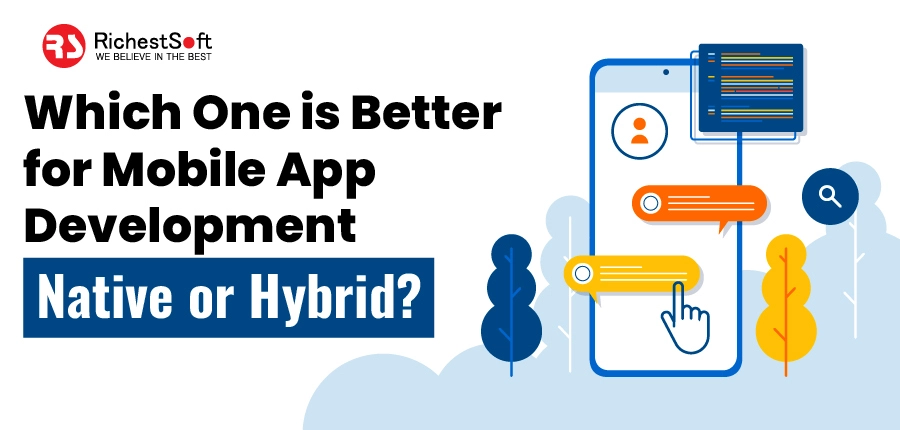For those who want to build a mobile app for your business may have come across some different options during your preliminary research. It is true that not all development methods are the same and you have a couple of different ways to approach mobile app development.
Let’s discuss these platforms, one by one:
What is a Native Application?
Native Application is a software or program which has been developed to perform some specific task on a particular environment or platform.
A native app is a smartphone application built specifically for a particular mobile operating system (iOS, Android, or Windows).
The software development tool (SDK) used to build a certain application, software framework, hardware platform or operating system.
Like an Android app built using the Java Development Kit on Java platform, iOS app built using iOS SDK, Swift and Objective C. Similarly, .NET required for Windows platform.
These native apps are built for a single platform only. They are mainly based upon the programming languages which are particular to the one platform only.
Since these apps are developed in languages that are specific to a platform, they can only be used on that platform. For e.g., if you have built an app for android then it will work for the Android platform only. There are various best mobile application development companies those are still working on this platform.
So, you will have to get two versions of an app ready if you want to provide a business app for all two different platforms.
It is very difficult in this competitive era to handle two versions simultaneously. Since the native apps are particular to a platform, these can access the full functionality of the device.
This boosts their performance as well as speed. If these are correctly developed, they can run without error.
Native apps can make use of push notifications, alerting users when their attention is required in the app.
You get the opportunity to continually bring your audience back for more, which is key to a successful app.
Advantages of Native Apps
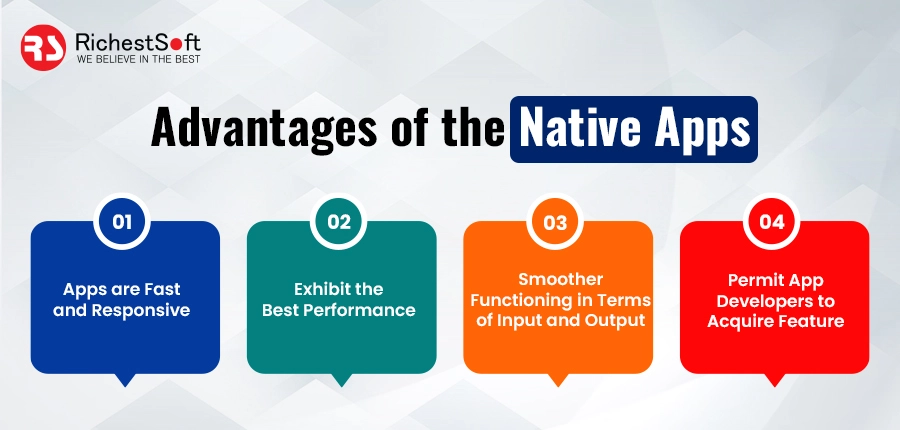
Native App tends to be faster and show better functionality than hybrid apps. Native apps support it in a better ay if you are looking for to put forth HD games, graphical applications, and intensive animations. This is because these apps function faster than hybrid ones. Additionally, the Software Development Tools (SDK) for native apps are able to access the features of the device they run on.
Popular Advantages of the Native Apps are as Follows:
- These apps are fast and responsive.
- Exhibit the best performance.
- Allows more interaction, intuition, and smoother functioning in terms of input and output.
- It doesn’t require any internet connection.
- Permit app developers to acquire feature of the given platform.
As we know that every coin has two sides, similarly this app also has some limitations. These are:
- Development is slow
- The app development cost is high.
- It requires the professional in this field to handle it.
- Not such a worthy investment for simple apps.
Some Native App Examples
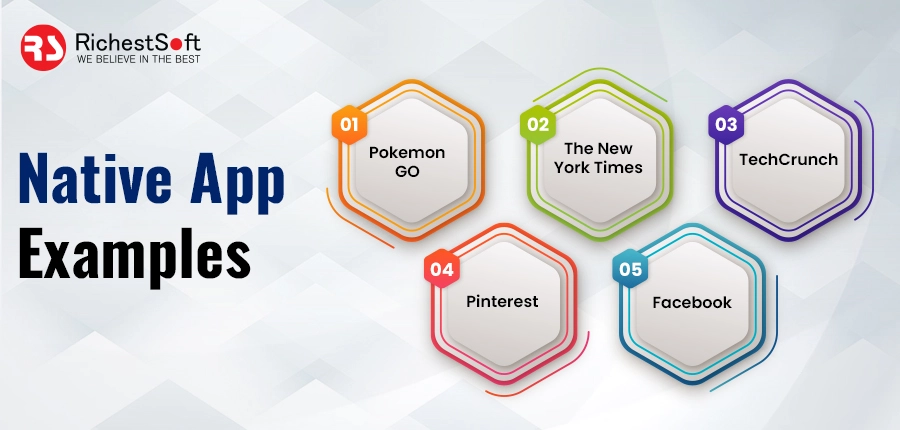
- Pokemon GO
- The New York Times
- TechCrunch
Native App Platforms
As we said, the main disadvantage of native apps is having to develop apps separately for each platform you want to cover.
That’s still true if you want to stick to the native SDKs provided by Apple and Google, but in the last few years, several alternatives have become available to reap the benefits of cross-platform development without sacrificing the user experience or access to native APIs.
1. React Native
React Native handles multiple platforms gracefully. Most of the React Native APIs are cross-platform, so there is need to write just one React Native component and it will work perfectly on iOS and Android both platforms.
2. Xamarin
It is mainly used to develop native apps for specific mobile platforms. Xamarin allows you to use the existing data access and business logic layers across multiple platforms. It is widely used to build an app for iOS, windows and Android App development.
What is a Hybrid Application?
Hybrid apps are native apps only when apps only because it can be downloaded from platform app store like native apps.
It has access to all the native platform features. It can have performance close to a native app. These hybrid apps are based on the web view.
Mainly these apps use the native app wrapper that establishes communication between the web view and native device platform.
Hybrid apps are developed due to tools that link the native platform with the web view and allow them to communicate. These are third-party tools like Apache Cordova.
These hybrid apps are built using languages such as CSS, HTML, and JavaScript. It is known as a hybrid because it has two main parts.
The first one is the back-end code which is built using the language defined above. And the other part is a native shell, which makes the app downloadable.
Advantages of the Hybrid Apps
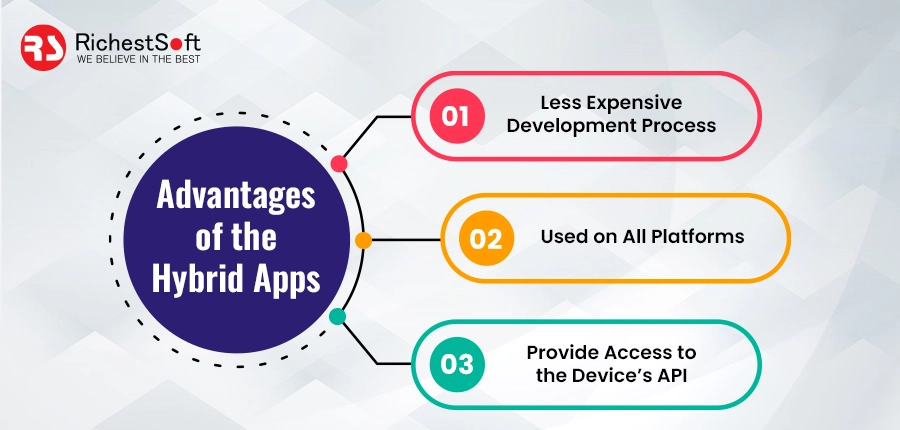
These applications don’t take extensive development time. You need to develop only one app, which will run on multiple platforms. The main pros of a hybrid app are:
- It is the less expensive development process
- Used on all platforms
- Provide access to the device’s API and it can acquire the camera, storage, etc.
Disadvantages of a Hybrid Apps:
Hybrid apps also have some cons. These are:
- Slower as compared to the Native apps.
- Less interactive in nature.
- Moderate user experience.
- Depends upon the third party wrapper.
Hybrid Apps Examples
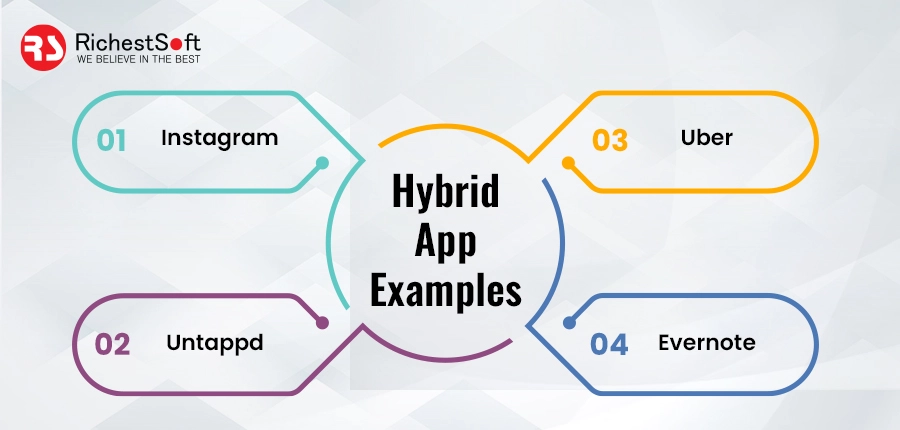
- Untappd
- Uber
- Evernote
Hybrid App Platforms
Main platforms of the hybrid app are:
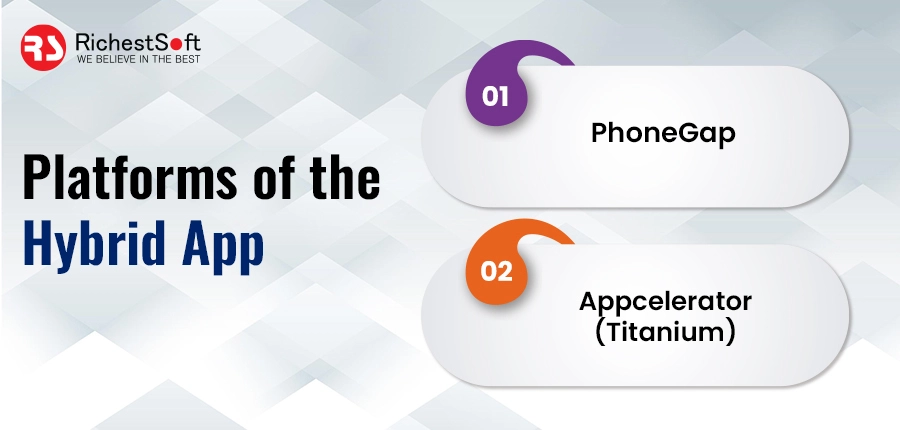
1. PhoneGap
PhoneGap is an open source and free mobile app development framework. It also comes under the category of cross-platform app development. It is used to build a single app which furthers works with numbers of platforms.
2.Appcelerator (Titanium)
As its name indicates, this tool is mainly used to speed up the app development process as it used fewer lines of code. It supports the development of native and cross platforms both types of apps. This tool can use to create Android, HTML-5 browser and iOS based applications.
Comparison Between Native and Hybrid Apps
The difference between the native and hybrid apps is almost clear. Let’s discuss it one by one:
- The native app build for the particular one platform, but a single hybrid app can work on many platforms.
- Hybrid apps are built using web technologies such as HTML, CSS, and JavaScript, on the other hand, Native apps built with specific language and technology for a specific platform like Swift for iOS and Java for Android.
- Native apps are built into the app programming language such as Java for Android and Swift for iOS. On the other hand, hybrid apps are made using web technologies like CSS, HTML, and JavaScript.
- As native app are sticking to the one platform only then you will need a developer that is skilled and understands the languages particulars to the platform. This thing translates into more effort, money and time that is required for the development processes. But a hybrid app case is opposite to it.
Development time is not long, and a single app runs on all platforms, so you need only one mobile app for your business. Lastly, native apps provide a better user interface and enhanced speed than the hybrid ones.
Examples of native apps include PayPal and Gmail. Likewise, Baskin Robbin and Untappd fall into the category of hybrid apps.
| Features | Native | Hybrid |
|---|---|---|
| Programming Language | Native only | Native and web or web only |
| Platforms | Single for each platform | Multiple Platforms |
| Speed | Fast | Slow |
| Performance | Faster and more reliable by its design | Usually slower |
| Access to device-Specific Feature | Allow use of device-specific functionalities | Limited use device-specific functionalities |
| Access to Mobile Devices | Platform SDK allows access to all the APIs | It totally depends upon the tool |
| Code Portability | Use only for a single platform | It enables code porting to multiple platforms |
| User Interface | It has rich and attractive functionality | It never gives native experience to the users. |
| Advanced Graphics | It provides high-quality graphics | It depends upon the hybrid framework |
| Access to Native APIs | High | Medium |
| Compatibility with other Devices | Higher | Less |
| Development Cost | Medium to High | Low to Medium |
| User Experience | Best | Impossible to provide the best experience with just 1 application code for all platforms. |
| Paid or Free App | Paid | Free |
Which Type You Should Choose?
Native and Hybrid apps have their own pros and cons as we already have discussed them. The decision about the choice of app totally depends largely on the requirements of the organization. In order to make the right choice, it’s important to understand the differences of each opinion so that you can head in the right direction.
Native and hybrid both apps have their own strength and weakness, thus your final decision will depend almost entirely on your startup’s need. After considering your options, it’s important to work with app developers that can bring your idea to life efficiently and cost-effectively. At RichestSoft, we can help you choose the right app for your idea and connect you to our network of the best mobile application development company in India.
FAQs
Q1: What sets native and hybrid mobile app development apart?
Ans: Native app creation involves producing platform-specific apps with iOS or Android-specific languages and technologies. Hybrid app creation, meanwhile, makes use of online technologies such as HTML, JavaScript, and CSS to create applications that can operate on various platforms.
Q2: Which app development approach offers a performance edge: native or hybrid?
Ans: When it comes to performance, native apps take the lead. They tap into the device’s full capabilities and are optimized for the specific platform. In contrast, hybrid apps may exhibit slightly slower and less responsive behavior while providing cross-platform compatibility due to their reliance on web technologies.
Q3: What are the benefits of developing native apps?
Ans: Native apps excel in delivering an exceptional user experience. They offer superior performance and responsiveness by fully utilizing the device’s features. Moreover, developers can access platform-specific functionalities and APIs, resulting in robust and customized app experiences.
Q4: What are the benefits associated with hybrid app development?
Ans: Hybrid apps offer significant time and cost savings by enabling the creation of a single app that works across multiple platforms. They promote code reusability and facilitate easier maintenance. Hybrid apps can access certain device features through native wrappers, providing cross-platform compatibility.
Q5: How should I determine whether to choose native or hybrid app development for my project?
Ans: Selecting between native and hybrid app development hinges on various factors, including project requirements, target audience, performance demands, and available development resources. Native development suits complex apps that require top-notch performance and platform-specific features. On the other hand, hybrid development proves advantageous for simpler apps that prioritize cross-platform compatibility and cost-effectiveness.
Q6: What factors should you consider when designing native or hybrid apps?
Ans: It’s important to consider elements like project needs, target audience, goals for performance, and accessible development resources while choosing either native or hybrid development of apps. By evaluating these factors, you may decide if hybrid development’s affordability and universal compatibility better meet your objectives or if native development’s strong efficiency and platform-specific capabilities do.
Conclusion
In conclusion, the selection between native and hybrid app development hinges upon carefully evaluating various factors and considerations. Native app development emerges as the preferred choice due to its ability to deliver superior performance, a customized user experience, and access to platform-specific functionalities. It proves advantageous for complex applications that demand optimal performance and rely on device-specific features.
- On the other hand, hybrid app development offers cost-efficiency, code reusability, and multi-platform compatibility, making it an attractive option for simpler applications that prioritize broader reach and quicker development timelines.
- When reaching a decision, it is vital to thoroughly assess project requirements, target audience, performance expectations, and the resources available for development.
- By understanding the distinctions between native and hybrid app development, one can make a well-informed choice that aligns precisely with their unique objectives.
- Ultimately, engaging the expertise of seasoned app developers becomes instrumental in navigating the decision-making process and efficiently transforming ideas into reality.
Whether opting for native or hybrid app development, selecting the appropriate approach lays the foundation for successfully creating a mobile app that fulfills business goals and resonates with the intended audience.
 +1 315 210 4488
+1 315 210 4488 +91 798 618 8377
+91 798 618 8377